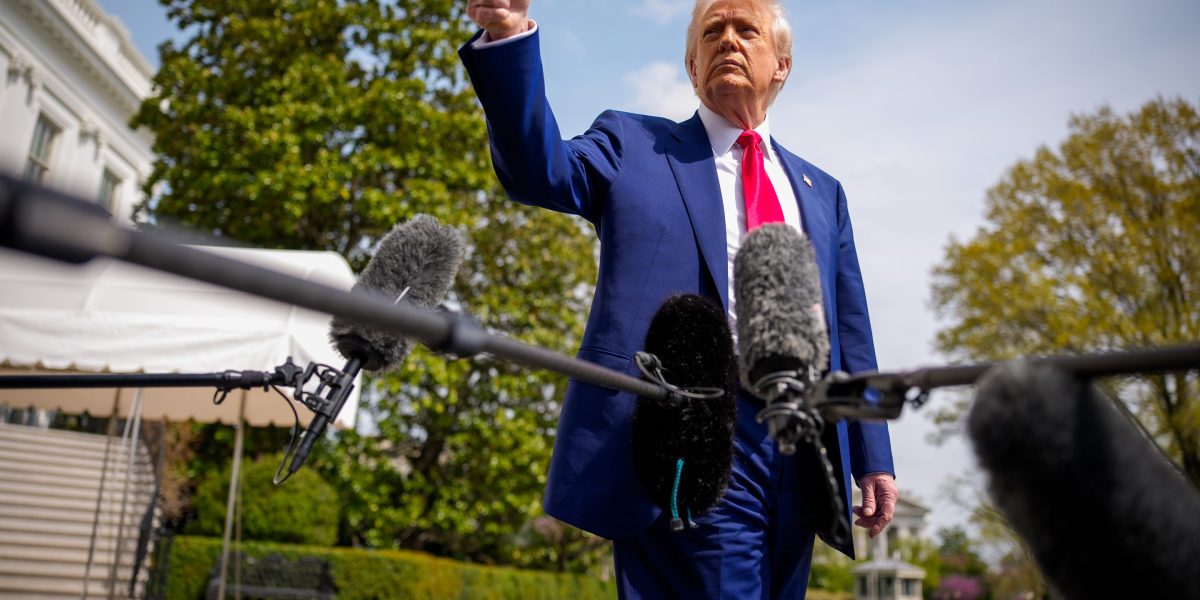- Respected economists and analysts across the board predicted President Trump’s so-called “Liberation Day” tariffs would have a major effect on the U.S. and world economies. Analysts agreed that the announcement was worse than market onlookers expected as the stock market plummeted Thursday in response.
It’s a truism that economists can’t agree on anything—but President Donald Trump’s so-called “Liberation Day” tariffs have analysts in rare agreement that major economic pain is coming, and it’s worse than any of them predicted. Indeed, it could be even “worse than the worst case.”
During a Wednesday speech at the White House, Trump announced a baseline 10% tariff on imports from all countries and revealed soaring tariffs, which he called “reciprocal,” on some of the United States’ biggest trading partners, including China, Japan, and the European Union.
The announcement sent markets tumbling, with all major indexes down Thursday afternoon. The benchmark S&P 500 was down 4.6% and the Dow Jones was down about 3.7%, but the tech-heavy Nasdaq, which in recent years has guided the stock market to new highs, led the losses with a 5.6% drop.
In response, a slew of respected economists and analysts from major global banks sounded the alarm on a potential recession and predicted changes to the world economic order.
Here are some of the most pointed takes from analysts as they try to make sense of the impending changes.
Wedbush Securities: “Worse than the worst case scenario”
Among the most dismayed was Dan Ives of Wedbush Securities. In a note from Wednesday afternoon, the veteran tech analyst and his team said Trump’s tariffs were even worse than expected.
“President Trump just finished his tariff speech at the White House and we would characterize this slate of tariffs as ‘worse than the worst case scenario’ the Street was fearing,” the analysts wrote.
Ives and his team added that the tariffs on China and Taiwan would especially weigh on technology, and the supply chains of the world’s biggest companies would suffer. The analysts called out Apple, which produces most of its iPhones in China, and Nvidia, which has significant exposure to Taiwan’s semiconductor industry.
In a follow-up note on Thursday, Ives’ team took a shot at the Trump administration’s calculations for the tariffs, calling them “illogical and absurd.”
“If a 9th grader in high school presented this tariff chart to a teacher in a basic economics class the teacher would laugh and say sit down and work on the assignment,” they wrote.
The Wedbush analysts suggested that the absurdity of the numbers show that the tariff rates couldn’t possibly be final and that deals with trading partners are likely to follow. If not, stagflation, the deadly combination of low growth and high inflation, would follow quickly, they wrote.
“Over the coming 24 hours the world will quickly realize these tariff rates will never stay as they are shown otherwise it would be a self-inflicted Economic Armageddon that Trump would send the US and world through over the coming year,” the analysts wrote.
Larry Summers goes after Trump
Former Treasury Secretary Larry Summers took a shot at Trump in a series of posts following the president’s tariff announcement Wednesday.
The respected economist wrote that Trump’s speech cost many Americans real money.
“Never before has an hour of Presidential rhetoric cost so many people so much. Markets continue to move after my previous tweet. The best estimate of the loss from tariff policy is now is closer to $30 trillion or $300,000 per family of four,” Summers wrote in a Wednesday post.
In later posts, Summers also criticized the Trump administration’s calculations, saying they made no sense.
“This is to economics what creationism is to biology, astrology is to astronomy, or RFK thought is to vaccine science,” Summers wrote. “The Trump tariff policy makes little sense EVEN if you believe in protectionist mercantilist economics.”
Finally, Summers—who headed the Treasury under President Bill Clinton—wrote that the tariff announcement was so bad, he would not have tolerated it were he in a government position.
“If any administration of which I was a part had launched an economic policy so totally ungrounded in serious analysis or so dangerous and damaging, I would have resigned in protest,” he added.
Goldman Sachs: Hardware companies to increase prices
Analysts at Goldman Sachs noted that Wednesday’s tariffs were higher than expected and that they would have an effect on hardware companies—even if negotiations ultimately bring those tariff rates lower.
“The magnitude of the tariffs announced is much higher and broader than anticipated by us and investors, and while many might argue that changes could occur through negotiations over the coming days and months, if sustained, the magnitude of the tariff would offer limited options for hardware companies to adjust their supply chains or wait out the term of the current administration,” they wrote in a Thursday note.
The Goldman analysts predicted that because of the breadth of the tariffs, which affect all countries, “price increases to offset the headwinds will be more than just modest.”
The analysts predicted a 5% increase in prices for hardware companies, but some companies with a larger reliance on hardware would take the biggest revenue hits of more than 50%, including information technology company Supermicro, broadband and software company Calix, and optical material and semiconductor manufacturer Coherent.
Oxford Economics: “a global recession will likely be avoided”
One of the rare, slightly upbeat notes came from economic advisory firm Oxford Economics, whose analysts wrote that a recession may not be on the horizon.
“The implementation of the US ‘Liberation Day’ tariff hikes will have a huge impact on individual sectors and firms and will further dampen sentiment. However, our initial assessment suggests a global recession will likely be avoided,” analysts from the firm wrote.
Still, U.S. imports could fall by 15% in three years due to the reciprocal tariffs, which could hit global GDP by 0.5 percentage points this year and 1 percentage point in 2026, the analysts said.
They also believe that any hopes of lessened uncertainty following the Wednesday announcement were unfounded. Even if countries were able to negotiate tariffs down lower or to nothing, the process would still be long.
“One hope is that deals will be struck quickly, meaning that tariff hikes are partially or fully reversed. While such an outcome is possible, tariffs typically rise quickly but fall slowly. With many economies subject to individual reciprocal tariffs, governments may face a lengthy wait before they can even enter negotiations,” the analysts wrote.
This story was originally featured on Fortune.com
Source link

 Entertainment8 years ago
Entertainment8 years ago
 Politics8 years ago
Politics8 years ago
 Entertainment8 years ago
Entertainment8 years ago
 Entertainment8 years ago
Entertainment8 years ago
 Tech8 years ago
Tech8 years ago
 Tech8 years ago
Tech8 years ago
 Tech8 years ago
Tech8 years ago
 Politics8 years ago
Politics8 years ago







